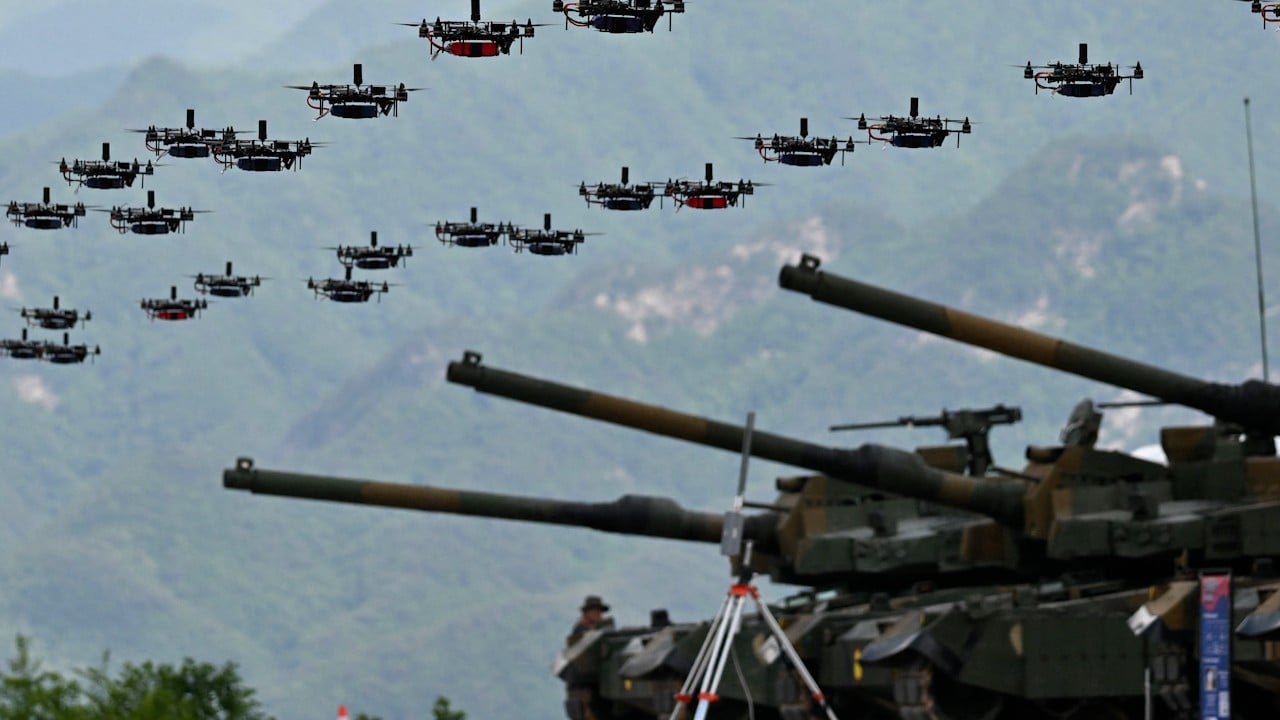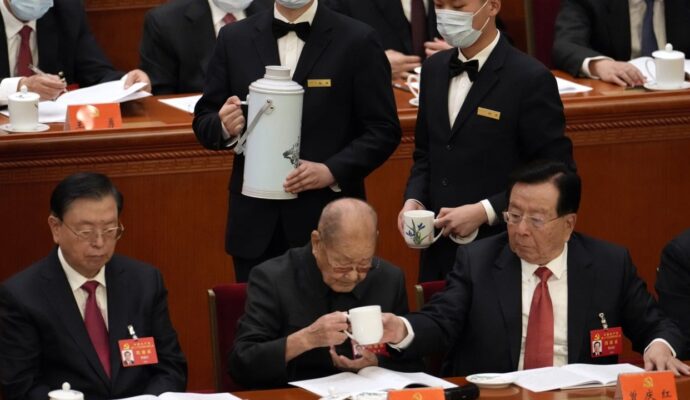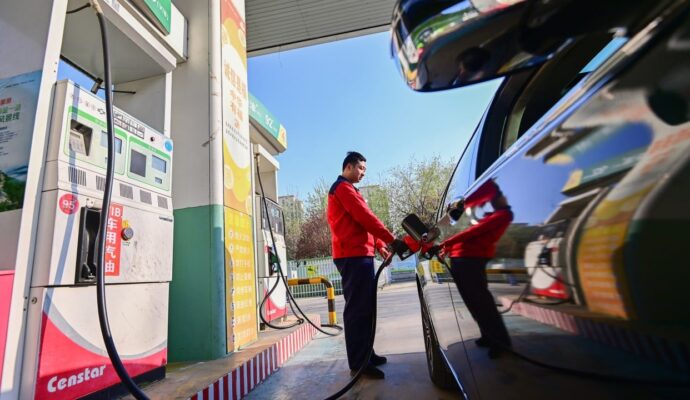The two countries are also exchanging heated military signals around Taiwan, with the US ramping up its military support despite Beijing’s repeated warnings, and the People’s Liberation Army inching ever closer to the island in its drills.
Any meeting in Singapore is likely to be tense but observers say the stakes of the superpowers not talking to each other in the new cold war era are grave.
Tensions between Beijing and Washington were expected to improve this year, with the US and Chinese presidents meeting in Bali last November and agreeing to better communication.
But then came the downing of a suspected Chinese spy balloon in American waters, prompting US Secretary of State Antony Blinken to cancel a trip to China.
Ni Lexiong, a professor with the Shanghai University of Political Science and Law, said the Pentagon was also ramping up military pressure on China, with plans to deploy an Ohio-class submarine to the Korean peninsula for regular patrols and Nato looking to set up its first office in Japan.
“The US has tried its utmost to rope all China’s neighbours in its camp to further isolate and contain China, putting the Chinese military delegation in a very disadvantageous position when they are encountering foreign counterparts, especially the Americans, at the [Shangri-La Dialogue],” he said.
The result was an international environment that had become more unfavourable towards China, Ni said.
US Defence Secretary Lloyd Austin will also attend and give a speech on Saturday. Li is expected to make an address about “China’s new security initiatives” on Sunday. In both cases, attendees will have a chance to ask questions of the speakers.
The chances of a Li-Austin meeting, however, seem low, with the Pentagon saying on Tuesday that Beijing had rejected such a proposal after reportedly sitting on the request for weeks.
“The United States and the Department of Defence have an outstretched hand on this question of military-to-military engagement and we have yet to have had a consistently willing partner [in China],” US assistant secretary of defence for Indo-Pacific security affairs Ely Ratner said last week.
Senior Colonel Tan Kefei, a spokesman for China’s military, on Wednesday said the US was “solely responsible” for the “difficulty of communication”, and that “dialogue cannot be done without principles”.
A major stumbling block to a meeting are the sanctions the US has placed on the Chinese general, according to Zhou Chenming, a researcher with the Beijing-based Yuan Wang military science and technology think tank.
The sanctions relate to China’s purchase of SU-35 combat aircraft in 2017 and S-400 surface-to-air missile system-related equipment from Russia in 2018.
“But Li’s attendance is still a goodwill response to US President Joe Biden’s earlier remark that he expects a thaw in frosty relations with China soon,” Zhou said.
“The PLA is still willing to keep the military-to-military relationship with its American counterpart as a stabiliser in China-US ties.”
Zhou said the PLA was unhappy that the US, in asking for the meeting, refused to lift the sanctions it had imposed on Li.
“If the Pentagon said that the sanctions do not affect communication between the two militaries, why couldn’t Washington simply just lift them?”
Zhou said Beijing also felt betrayed by Biden, who had promised Xi in their personal calls to “improve bilateral ties”, but had not kept his word.
Zhou said an example was that Biden said the White House was discussing a decision to lift the sanctions on Li, but it was “turned down overnight by the State Department”.
“The inconsistency of the sanction decision indicated the Biden administration was hijacked by next year’s US presidential election – it’s ‘politically incorrect’ to show weakness to China, making Beijing feel a meeting between Li and Austin is less meaningful if Washington keeps its ‘unfriendly attitude’ towards China,” Zhou said.
The Shangri-La Dialogue was initiated in 2002 but Beijing has not always sent defence ministers as its representatives.
In the past, Beijing sought to play down the importance of the dialogue – seen as a platform dominated by Washington and its Western allies – and sent lower-level PLA officials.
That approach changed when the forum marked its 10th anniversary in 2011. China sent a high-level delegation led by then-defence minister general Liang Guanglie.
China then returned to sending lower-level officers until 2019 when Wei Fenghe, Li’s predecessor as defence minister, represented the PLA at the dialogue and had his first in-person meeting with his US counterpart Patrick Shanahan. Wei returned to the dialogue last year and met Austin.
Zhou Bo, a senior fellow at the Centre for International Security and Strategy at Tsinghua University and a China Forum expert, said the Shangri-La Dialogue had since become not only the most important defence summit in Asia but also the world’s second most influential security forum after the Munich Security Conference, held in Germany since 1963.
“Chinese senior military officials understand the importance of letting their voice be heard by the international community, with the Shangri-La Dialogue being an effective and valuable platform,” he said.
He said the Chinese delegation this year would focus on explaining China’s position on the war in Ukraine.
“The Ukraine war has become a watershed event for many countries’ foreign policy, and China’s long-standing close relationship is under a lot of scrutiny, especially in the shadow of potential conflicts in the Taiwan Strait,” Zhou Bo said.
“The Shangri-La Dialogue will provide a timely opportunity for the PLA to communicate with its foreign counterparts directly.”
Zhou Bo, a retired senior colonel, said the PLA delegates were also likely to use the opportunity to explain Beijing’s military responses over Taiwan following the stopover visit by Taiwanese President Tsai Ing-wen to the US in April and the visit by former US House speaker Nancy Pelosi to the self-ruled island last summer.
“[The] PLA’s activities in response are actually measured and appropriate … and that should be understood by our Asian neighbours,” he said.
Taiwan has become a main concern for countries in the region. It was first mentioned by former US secretary of defence James Mattis at the Shangri-La Dialogue in 2017, provoking the PLA delegation to denounce the US military’s “attempt to support Taiwan independence”.



